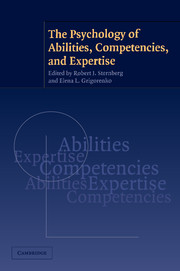Book contents
- Frontmatter
- Contents
- Preface
- List of Contributors
- The Psychology of Abilities, Competencies, and Expertise
- 1 Trait Complexes, Cognitive Investment, and Domain Knowledge
- 2 Intelligence as Adaptive Resource Development and Resource Allocation: A New Look Through the Lenses of SOC and Expertise
- 3 Developing Childhood Proclivities into Adult Competencies: The Overlooked Multiplier Effect
- 4 The Search for General Abilities and Basic Capacities: Theoretical Implications from the Modifiability and Complexity of Mechanisms Mediating Expert Performance
- 5 On Abilities and Domains
- 6 Expertise and Mental Disabilities: Bridging the Unbridgeable?
- 7 The Early Progress of Able Young Musicians
- 8 Expertise, Competence, and Creative Ability: The Perplexing Complexities
- 9 Biological Intelligence
- 10 What Causes Individual Differences in Cognitive Performance?
- Index
Preface
Published online by Cambridge University Press: 05 June 2012
- Frontmatter
- Contents
- Preface
- List of Contributors
- The Psychology of Abilities, Competencies, and Expertise
- 1 Trait Complexes, Cognitive Investment, and Domain Knowledge
- 2 Intelligence as Adaptive Resource Development and Resource Allocation: A New Look Through the Lenses of SOC and Expertise
- 3 Developing Childhood Proclivities into Adult Competencies: The Overlooked Multiplier Effect
- 4 The Search for General Abilities and Basic Capacities: Theoretical Implications from the Modifiability and Complexity of Mechanisms Mediating Expert Performance
- 5 On Abilities and Domains
- 6 Expertise and Mental Disabilities: Bridging the Unbridgeable?
- 7 The Early Progress of Able Young Musicians
- 8 Expertise, Competence, and Creative Ability: The Perplexing Complexities
- 9 Biological Intelligence
- 10 What Causes Individual Differences in Cognitive Performance?
- Index
Summary
Some people study abilities, some study expertise, but few study both. Traditionally, the study of abilities has been seen as relatively distinct from the study of expertise, and the literatures that have developed in these two areas are largely distinct as well.
Ability theorists have argued about alternative factorial, process, biological, contextual, or other models of expertise, but, with few exceptions (such as Howard Gardner), have drawn only sparse links between their studies and studies of expert performance. Individuals with high levels of expertise are simply assumed to have developed these high levels of expertise as a function of their high levels of abilities.
Expertise theorists have argued about what it is that makes someone an expert, such as outstanding information processing or a highly organized knowledge base, or they have argued about how expertise is acquired, for example, through deliberate practice or skilled apprenticeship. They have failed to consider fully the role of expertise in the development and maintenance of expertise, and indeed, few expertise theorists have used any tests of abilities in their research.
Competencies often have been viewed as an endpoint in the study of abilities (for example, as providing criteria against which measures of abilities are validated) or as a beginning point in the study of expertise (for example, as providing a baseline for novices, or at least, nonexperts, against which expertise performance can be compared). Competency theorists have sometimes linked their work to abilities, and sometimes to expertise, but rarely to both.
- Type
- Chapter
- Information
- The Psychology of Abilities, Competencies, and Expertise , pp. vii - xPublisher: Cambridge University PressPrint publication year: 2003



